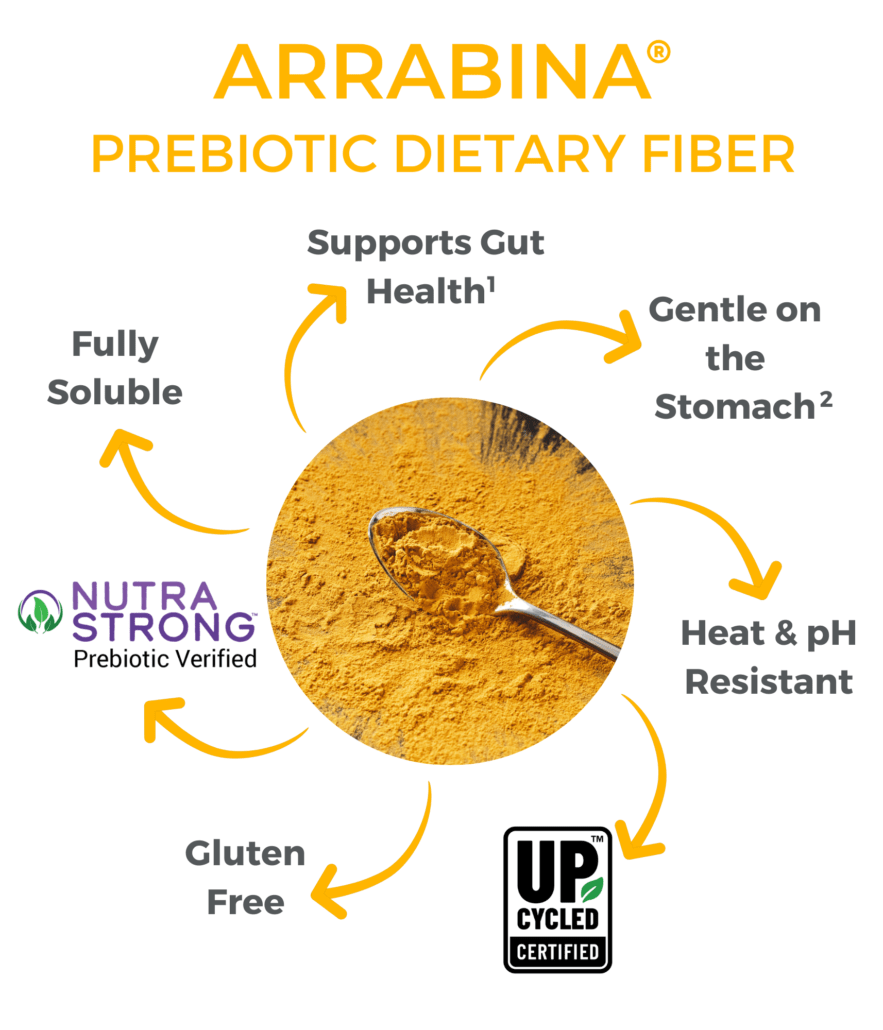The number of food and beverages that contain functional prebiotic fiber is on the rise, given increased consumer attention to overall gut health. Prebiotics are used by the microorganisms in your digestive tract and shown to positively influence our health. However, R&D leads should take caution to formulate using an optimally performing ingredient so that inclusion levels can 1) better align with gut health related health claims, 2) improve upon consumers’ gut health without causing gut discomfort, 3) provide greater effect at lower doses, and 4) withstand your unique processing and distribution needs.
Inulin: Better than Wheat Fiber Extract?
Inulin has been the conventional prebiotic fiber choice for many brands wanting to make a fiber or digestive health claim, but formulation issues and consumer complaints of gastric distress are driving manufacturers to look for a better option. Additionally, this year’s Poppi-brand, “gut healthy” soda lawsuit has shed light on inulin’s issues including a high-dose needed for claims and consumer-reported GI distress at those levels. A quick description of the two can highlight their differences.
What is Inulin?
Inulin is a single type of fiber extracted from chicory root. It can also be found naturally in whole wheat and some vegetables and fruits. Inulin and chicory are considered high in FODMAPs, specifically, oligosaccharide carbohydrates that cause digestive distress in people who are sensitive to them.
Functional performance tests indicate that inulin provides digestive prebiotic benefit at 5-grams per serving, however, tolerability to this level of chicory-based fiber tends to max out at far less than this level. Many Poppi-drinking consumers, for example, report distress with just 2 grams of inulin.
What is Arabinoxylan?
Arrabina® wheat fiber extract is an arabinoxylan-based prebiotic fiber blend derived using COMET’s proprietary upcycling technology Arrabina® is gently extracted using only water and steam, leaving its natural diversity of five different prebiotic fibers intact, which are beneficial to the gut microbiome, gluten-free, FODMAP-friendly and clinically-tested to be gentle on the Stomach2.
The GI Effect of Prebiotics: Arrabina® Performs Better
When we consume soluble dietary fiber, bacteria in the colon begin a process called fermentation. From that fermentation, we yield short-chain fatty acids (SCFAs), which leads to measurable growth of beneficial bifidobacteria to support the gut microbiome and is associated with reduced inflammation in the body. Fermentation also yields natural gases (which can cause bloating and discomfort), although in an optimal formulation, you would yield greater SCFAs with a smaller amount of prebiotic fiber and the least amount of gas.
In an in vitro study comparing Arrabina® with inulin, Arrabina® was clinically proven to produce both 10-18% more SCFA production and 20% less gaseous discomfort at comparable 5 mg doses. In fact, research has shown Arrabina is highly tolerable even at a 15-gram level or up to 5 servings per day.
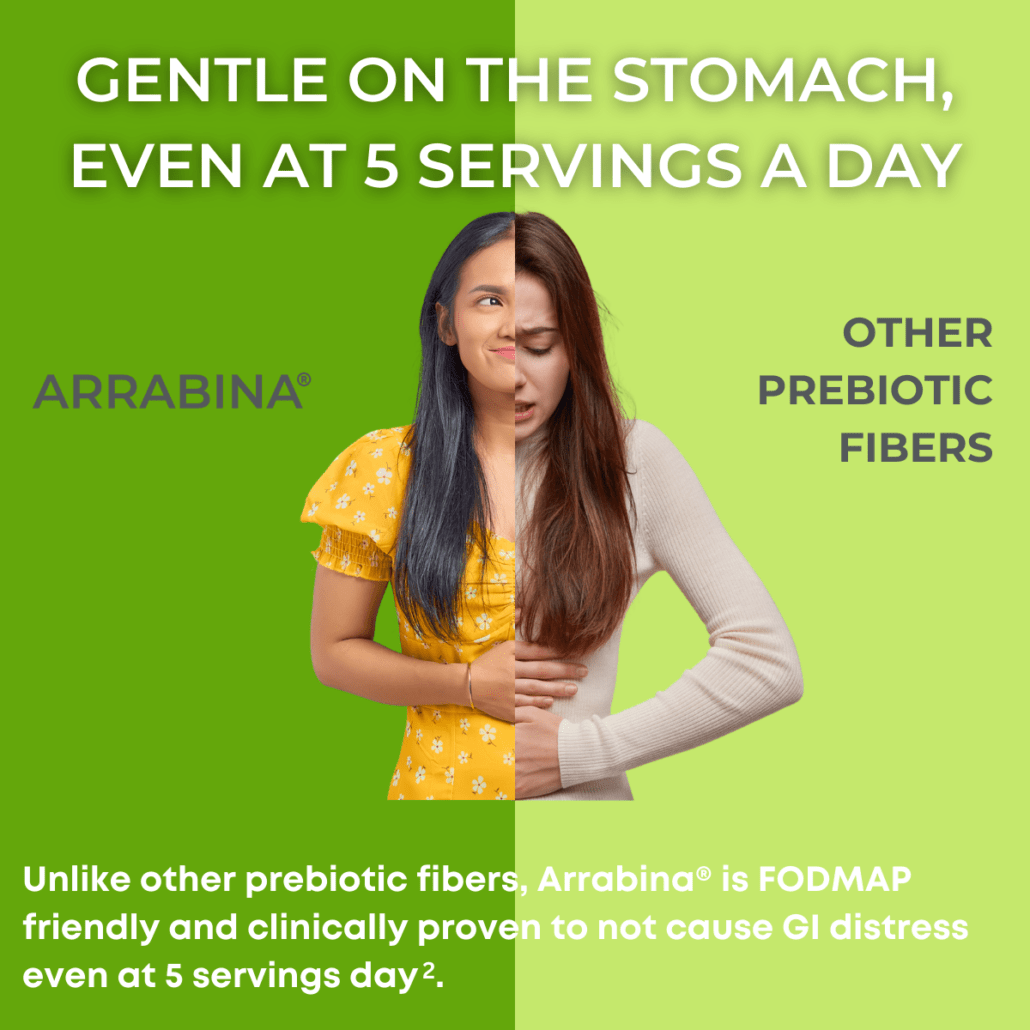
Read more about this clinical study here.
MORE ON FODMAPs
FODMAP is an acronym that stands for Fermentable Oligosaccharides, Disaccharides, Monosaccharides and Polyols, or short-chain carbohydrates (sugars) that the small intestine absorbs poorly.
Some people experience digestive distress include gas, bloating, cramping and diarrhea after eating foods that include them.
Interestingly, it is common for food manufacturing to include more than one FODMAP ingredient in functional food and beverage product development in an effort to reduce sugar and increase fiber (e.g., inulin and sugar alcohols).
These combinations only exacerbate tolerance issues.
Why is Arrabina®’s Diverse Blend of Fibers Better?
Having greater diversity of fibers translates to greater diversity of gut microbes and greater breadth of health benefits. Based on in-vitro testing, at a 5 gram dose, inulin fermentation yields two types of SCFAs in the gut, whereas the fiber diversity in arabinoxylan – even at a 3 dose — brings about a unique array of seven SCFAs, which offers more diverse and powerful prebiotic benefit, and better reflects the variety that you’d find in nature.
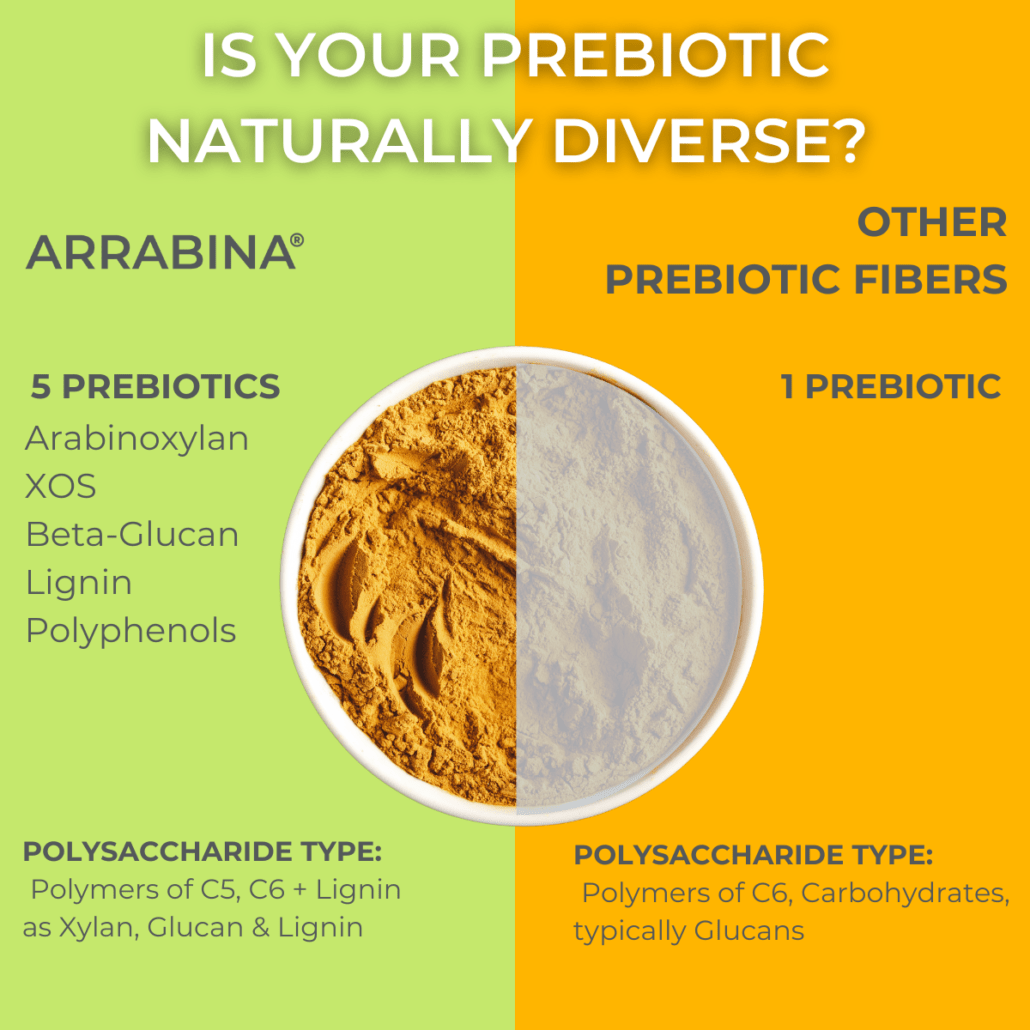
Arrabina® Requires Less COMET’s powder fiber formulations are easily blendable at a low dose, which makes for a seamless integration within existing formulations and can enhance your nutritional profile and labeling content in a big way.
Comparative studies show that it takes only 3.6 grams of Arrabina® to provide the same nutritional efficacy as 5 grams of other fibers like chicory root inulin. As skeptical consumers and consumer advocacy watchdogs are quick to point out, and possibly even strike up litigation, they want to know a product will do what it says.
Therefore, a low-dose ingredient can go a long way to ensuring your product efficacy and your customer’s comfort and satisfaction. Read more about Arrabina®’s low-dose efficacy here.
Arrabina® Requires Less
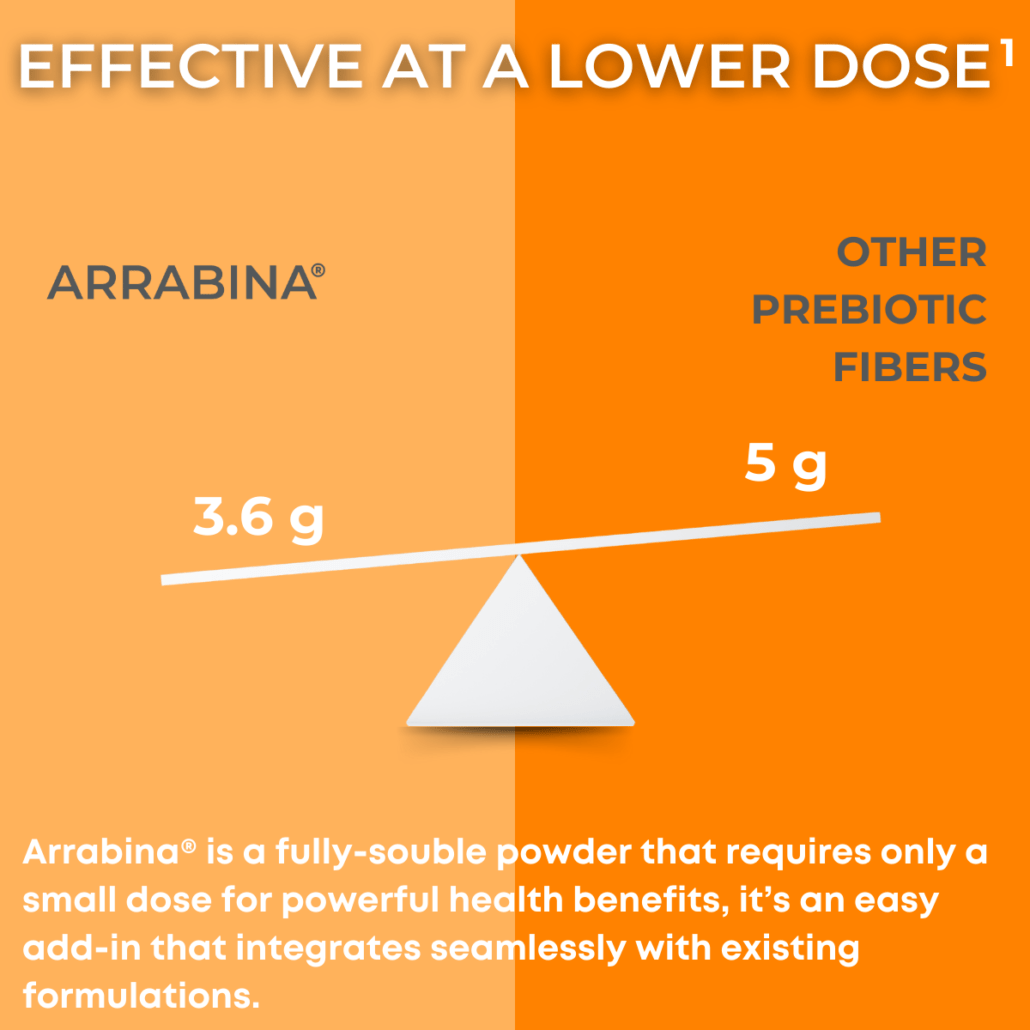
COMET’s powder fiber formulations are easily blendable at a low dose, which makes for a seamless integration within existing formulations and can enhance your nutritional profile and labeling content in a big way.
Comparative studies show that it takes only 3.6 grams of Arrabina® to provide the same nutritional efficacy as 5 grams of other fibers like chicory root inulin. As skeptical consumers and consumer advocacy watchdogs are quick to point out, and possibly even strike up litigation, they want to know a product will do what it says.
Therefore, a low-dose ingredient can go a long way to ensuring your product efficacy and your customer’s comfort and satisfaction. Read more about Arrabina®’s low-dose efficacy here.
Ready-to-Drink Beverages that Withstand the Heat and the Hype
Stability of prebiotic fibers through processing and production can be the limiting factor for many beverage producers. Inulin, for example, is known to break down to simple sugar when exposed to an acidic environment and high heat, particularly over time.
This creates challenges in product formulations and the need for refrigeration to extend shelf-life. On the contrary, Arrabina® prebiotic fiber blends are versatile and can withstand extreme temperatures and pH levels with minimal product degradation – in a variety of formulations — and are tolerant of otherwise standard manufacturing processes, including hot fill beverage sterilization, retort or pasteurization.
Essentially, this means Arrabina® can help you formulate a product that includes prebiotic fiber and can withstand your production process, while living up to consumer expectations for a great tasting beverage that brings along fiber-focused nutritional benefits. Fortunately, not all prebiotics are created equal. Inquire with our teams about how COMET’s Arrabina® arabinoxylan prebiotic fiber powders can be the right choice for you.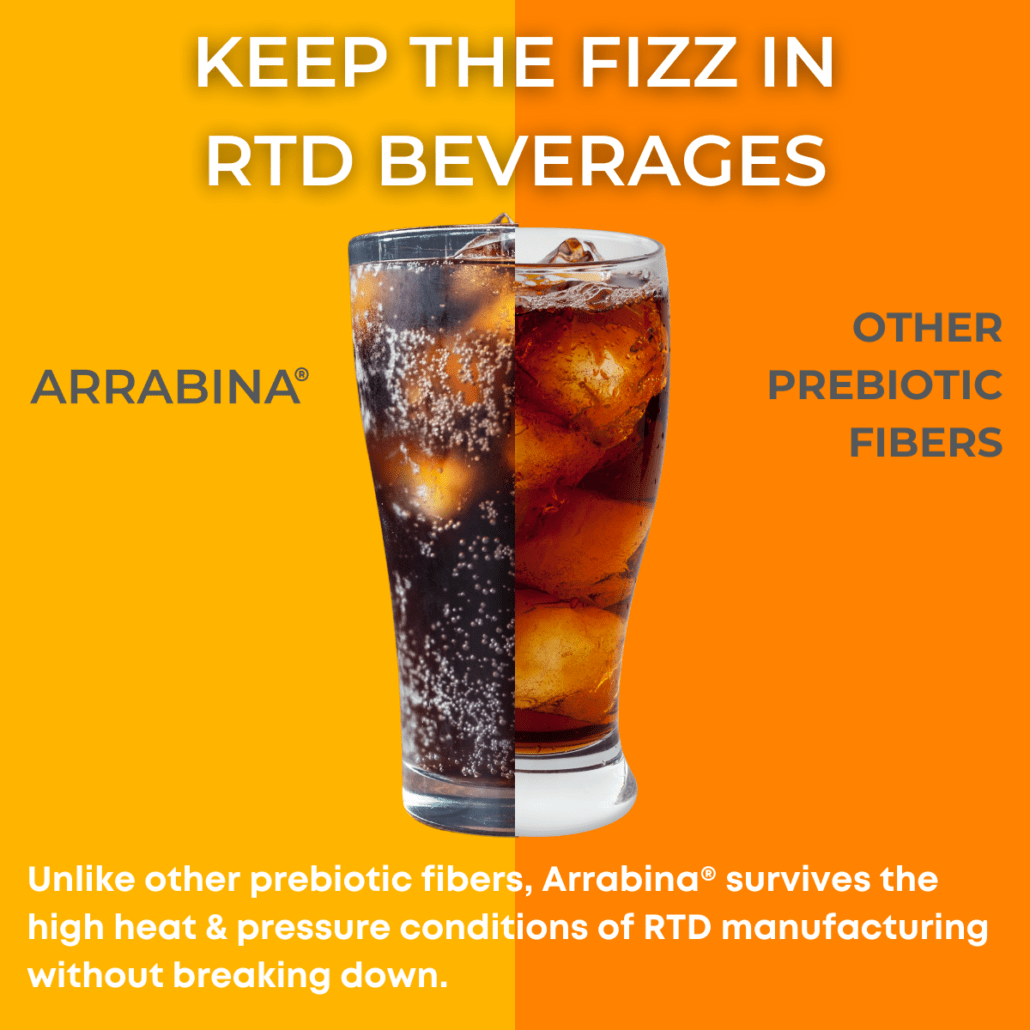
- ISAPP; Windley et al. 2015, Cloetens et al. 2010, Francois et al. 2014, Maki et al. 2012, Walton et al. 2012, Damen et al. 2012, Kjølbæk et al. 2019.
- Oliver Chen, Traci Blonquist, Kristen Sanoshy, Kathleen Kelley, Eunice Mah, The Effect of Arabinoxylan on Gastrointestinal Tolerance in Generally Healthy Adults: A Randomized, Placebo-Controlled, Crossover Study, >, Volume 5, Issue Supplement_2, June 2021, Page 304.

